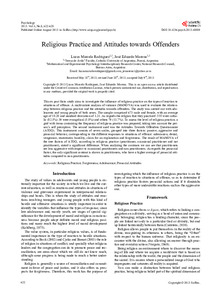Por favor, use este identificador para citar o enlazar este ítem:
https://repositorio.uca.edu.ar/handle/123456789/12782| Título: | Religious practice and attitudes towards offenders | Autor: | Rodríguez, Lucas Marcelo Moreno, José Eduardo |
Palabras clave: | PRACTICAS RELIGIOSAS; PERDON; PROSOCIALIDAD | Fecha de publicación: | 2013 | Editorial: | Scientific Research | Cita: | Rodríguez, LM., Moreno, J.E. Religious practice and attitudes towards offenders [en línea]. Psychology. 2013, 4(8) doi:10.4236/psych.2013.48089 Disponible en: https://repositorio.uca.edu.ar/handle/123456789/12782 | Resumen: | Abstract: This ex post facto study aims to investigate the influence of religious practice on the types of reaction to situations of offence. A multivariate analysis of variance (MANOVA) was used to evaluate the relation- ship between religious practice and the attitudes towards offenders. The study was carried out with ado- lescents and young people of both sexes. The sample comprised 673 male and female, with an average age of 18.28 and standard desviation of 1.21. As regards the religion that they practiced: 555 were catho- lic (82.5%) 39 were evangelical (5.8%) and others 79 (11.7%). To assess the level of religious practice, a grid with items containing the frequency of religious practice was prepared, taking into account the per- son’s self perception. The second instrument used was the Attitudes Towards Offenders Questionnaire (ATOQ). This instrument consists of seven scales, grouped into three factors: passive, aggressive and prosocial behavior, corresponding to the different responses to situations of offence: submission, denial, vengeance, resentment, hostility, claim for an explanation and forgiveness. The result of MANOVA of the tree factors of ATOQ, according to religious practice (practitioner, occasional practitioner and not practitioner), stated a significant difference. When analyzing the contrasts we can see that practitioners are less aggressive with respect to occasional practitioners and non practitioners. As regards the prosocial factor, the only significant contrast is shown in practitioners, who have a higher average of prosocial atti- tudes compared to non-practitioners. | URI: | https://repositorio.uca.edu.ar/handle/123456789/12782 | ISSN: | 2152-7180 2152-7199 (online) |
Disciplina: | PSICOLOGIA | DOI: | 10.4236/psych.2013.48089 | Derechos: | Acceso abierto | Fuente: | Psychology. 2013, 4(8) |
| Aparece en las colecciones: | Artículos |
Ficheros en este ítem:
| Fichero | Descripción | Tamaño | Formato | |
|---|---|---|---|---|
| religious-ptractices-attitudes.pdf | 133,44 kB | Adobe PDF |  Visualizar/Abrir |
Visualizaciones de página(s)
58
comprobado en 27-abr-2024
Descarga(s)
75
comprobado en 27-abr-2024
Google ScholarTM
Ver en Google Scholar
Altmetric
Altmetric
Este ítem está sujeto a una Licencia Creative Commons

